#moropus
Explore tagged Tumblr posts
Text

Moropus distans, a species of chalicothere from Miocene North America.
It was about 3 m. long and stood 2.4 m. tall at the shoulder. They are related to modern day horses, rhinos and tapirs.
illustration by Nobumichi Tamura
189 notes
·
View notes
Text


Moropus (meaning "slow foot")
Moropus is an extinct genus of large perissodactyl ("odd-toed" ungulate) mammal in the chalicothere family. They were endemic to North America during the Miocene from ~20.4–13.6 Mya, existing for approximately 6.8 million years. Moropus belonged to the schizotheriine subfamily of chalicotheres, and has the best fossil record of any member of this group; numbers of individuals, including complete skeletons, have been found. The closest extant relatives of Moropus are other perissodactyls: horses, rhinos, and tapirs...
Read more: Moropus - Wikipedia
129 notes
·
View notes
Text
@horsefigureoftheday does this count as a horse (CollectA Moropus)

#not a dinosaur figure of the day#moropus#trying to think of the intersection of horse and dinosaur has led me to ancient perissodactyls
149 notes
·
View notes
Text

#pseudopaleo#not a moropus#megafauna#really reminds me of the hirikka from the witcher#852#the the tapir's face was necessary ahahah (its one of their descendant ?)#tapir#donkey#bear#moropus#chimera#bestiary#creature design#ink#monster#978#octem 123#aer 4#the Unknown
85 notes
·
View notes
Text
Did I hallucinate this ice-age mammal?
Okay, this is driving me bonkers.
I have a strong memory of a critter from one of my childhood paleontology books of a large, pleistocene mammal that was a large herbivore with long, clawed forelimbs and a single, large horn on the head.
It was basically a moropus with a horn, and I remember the particular paleoart rendering it in yellow-brown (not relevant to the paleontology, but it might identify whatever critter I'm thinking of if someone remembers something similar from a paleontology for kids book from the 80s)
A moropus is this:

What I remember is this:

Now, there's several possiblities:
I am misremembering, and have combined elements of moropus and a wooly rhinoceros.
The animal in question was thought by some to have a horn in the 70s/80s, and that was either a fringe theory or one that has been superseded since.
The Paleoartist was having fun.
It was an exaggerated tylocephalonyx

I do not believe I'm thinking of something like synthetoceras, because it was a heavily built creature rather than a deer-like one.
Any ideas?
41 notes
·
View notes
Text


Moropus and Entelodont. Animal Ghosts. Edited by Claudia Clow. Illustrated by Walt Disney Productions. 1971.
Internet Archive
214 notes
·
View notes
Text

†Moropus elatus
Art credit: WillemSvdMerwe
Moropus was related to animals like Chalicotherium, and like them it fed by sitting back and using clawed hands to bring branches down to its mouth. But it had shorter forearms than its relatives, and was better at walking and running in open environments. It lived in North America from 13-20 million years ago, in forests and savannas. It was also much bigger than you’d think: it was 8 feet (2.4m) tall at the shoulder!
#markhors-menagerie#animal facts#animals#biology#fun facts#palaeontology#prehistoric animals#ungulates#odd toed ungulates#moropus
39 notes
·
View notes
Text

“In the course of twenty million years, mammals got more and more successful until they were the biggest, fiercest, and most spectacular animals on the planet. Whatever the climate, whatever the habitat, mammals made it their own. Their great strength was their ability to adapt. They grew to gigantic sizes, they evolved into powerful killers like the famous sabre-tooth cats, and they even laid claim to the oceans.”
- Kenneth Branagh, prologue to “Walking with Beasts”
Sketches of some of the incredible wildlife of the Cenozoic Era. None of the animals are exactly shown to scale. From left to right, bottom to top:
Arctocyon, Barylambda, Coryphodon, Titanoboa
Uintatherium, Notharctus, Mesonyx, Eobasileus
Leptictidium, Gastornis, Propaleotherium, Titanomyra, Godinotia, Pakicetus, Ambulocetus
Apidium, Arsinotitherium, Andrewsarchus, Embolotherium, Moeritherium, Dorudon, Basilosaurus, Perucetus
Megacerops, Cainotherium, Merycoidodon
Cynodictis, Paraceratherium, Hyaenodon gigas, Chalicotherium, Paraentelodon
Gentilicamelus, Amphicyon, Daeodon, Moropus, Dinocrocuta, Platybelodon, Gomphotherium, Pelagornis, Purussasaurus, Odobenoceratops, Otodus megalodon
Phoruschracos, Astrapotherium, Teleoceras, Synthetoceras, Samotherium, Livyatan
Australopithecus afarensis, Deinotherium, Ancylotherium, Dinofelis
Mammuthus columbi, Smilodon fatalis, Bison latifrons, Aenocyon dirus, Arctodus simus, Panthera atrox, Titanotylopus, Equus hersternus, Sivatherium, Gigantopithecus, Paleoloxodon
Smilodon populator, Macrauchenia, Doedicurus, Megatherium, Glyptodon, Toxodon
Mammuthus primigenius, Megaloceros giganteus, Coelodonta antiquitatis, Bos primigenius, Homo neanderthalensis, Elasmotherium, Bison bonasus
#paleoart#paleontology#cenozoic mammal#cenozoic animals#cenozoic mammals#cenozoic era#cenozoology#cenozoic#palaeontology#paleoartist#artists on tumblr#paleoartists on tumblr#paleoblr#paleogene#neogene#quaternary#paleocene#eocene#oligocene#miocene#pliocene#pleistocene#palaeoart#paleo#palaeoblr#paleoillustration
59 notes
·
View notes
Text
New ravager design just dropped

This time inspired more by extinct megafauna! Notably moropus (not any specific species) and the woolly rhinoceros. The markings are inspired by cave paintings, which often depict creatures with really stark markings. Whether or not this was an artistic choice, an effect of the medium, or actually accurate is probably questionable; but I like it so I did it regardless.
The lore of the previous design is basically the same, they’re just fluffy now :]
Bonus naked version:
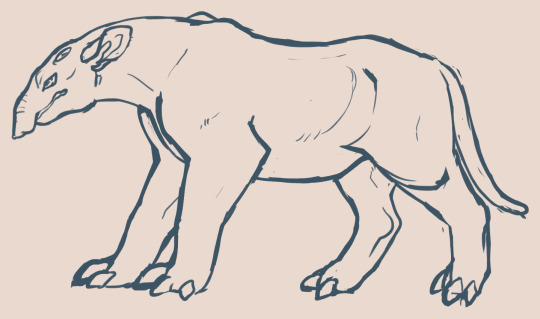
246 notes
·
View notes
Text
Artober Day 6. A skull from Moropus elatus, a type of Chalicothere.

3 notes
·
View notes
Text
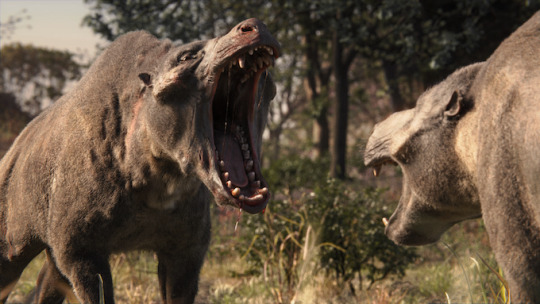
In case you haven't seen it yet, FORGOTTEN BLOODLINES has a Kickstarter now! I seriously recommend backing it!
Agate needs all the support it can get! It is the chance to show the world what a paleo documentary entirely produced by paleo people can look like!
We love to complain all the time about the state of paleo-media, this could help with changing it for the better!
(also it's voiced by NIGEL MARVEN)
kickstarter
Here the Kickstarter and trailer for the project!
Also: the coming Saturday we will have a special FB stream on Twitch, talking about the project and producing little sketches for people who backed the project ;)
#paleoart#sciart#agate falls#miocene#forgotten bloodlines#camel#daeodon#moropus#paleostream#palaeoblr#kickstarter
987 notes
·
View notes
Note
Moropus with four arms please.
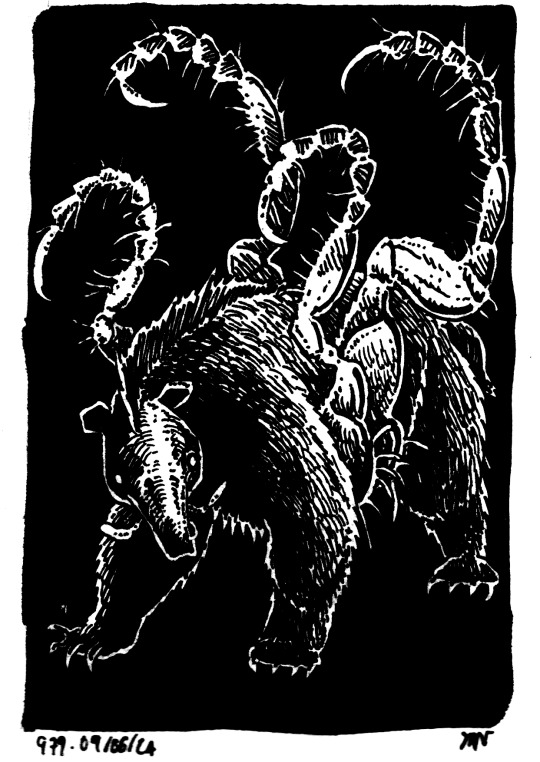
#i legit thought moropus was some kind of scifi monster by the name#turns out its a prehistoric mammalian#check 978 for the vanilla moropus#and so i wanted to make it scifiesque#the evolution of the moropus darwin didnt want you to know#again a pun because moropus sounds like “mort aux puces” in french and “puce” means lice#tapir#donkey#bear#moropus#pseudopaleo#evolution#suggestion#gaul-the-unmitigated#chimera#bestiary#monster#creature design#ink#979#octem 123#aer 4#the Unknown
65 notes
·
View notes
Text
New animals!
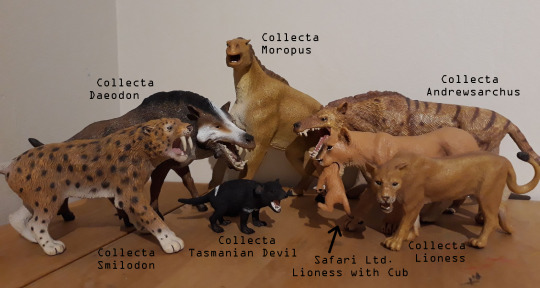
All are captioned for your convenience!

Andrew is quite bigger than lil’ Hyaenodon.
I’ll try and get some better pictures of all my megafauna figures together. Now there’s quite a few!
#Schleich#safari ltd#Collecta#animal figure collector#animal figure#Megafauna#smilodon#andrewsarchus#hyaenodon#lion#tasmanian devil#moropus#ice age#collector#lioness#lion cub#toy collector#toy collection#tanglestock
20 notes
·
View notes
Text
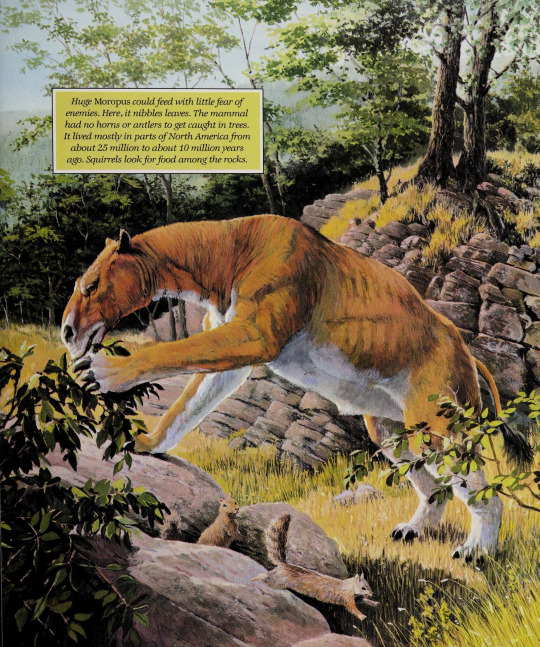
Giants from the Past: the Age of Mammals. 1983.
149 notes
·
View notes
Text
This incredible project is in dire need of support it's made by some amazing folks and represents a sorely represented period in paleomedia
Forgotten Bloodlines: Agate, via @Kickstarter https://www.kickstarter.com/projects/maxbellomio/forgotten-bloodlines-agate?ref=android_project_share
https://www.kickstarter.com/projects/maxbellomio/forgotten-bloodlines-agate?ref=android_project_share
2 notes
·
View notes
Text
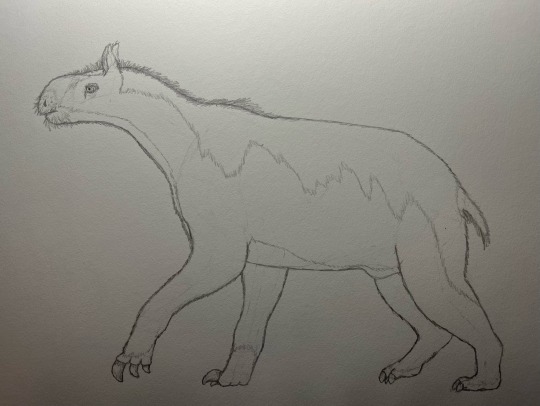
Moropus elatus was a schizotheriine chalicothere from the Miocene of North America. Chalicotheres are an extinct group of perissodactyls, or even-toed ungulates, related to horses, rhinoceros, and tapirs. Moropus’ subfamily, the schizotheriines, differed from their cousins the chalicotheriines by maintaining a heavily quadrupedal stance similar to other perissodactyls, while derived chalicotheriines developed a knuckle-walking stance to protect the long claws of their dextrous forelimbs, similar to gorillas and ground sloths.
3 notes
·
View notes